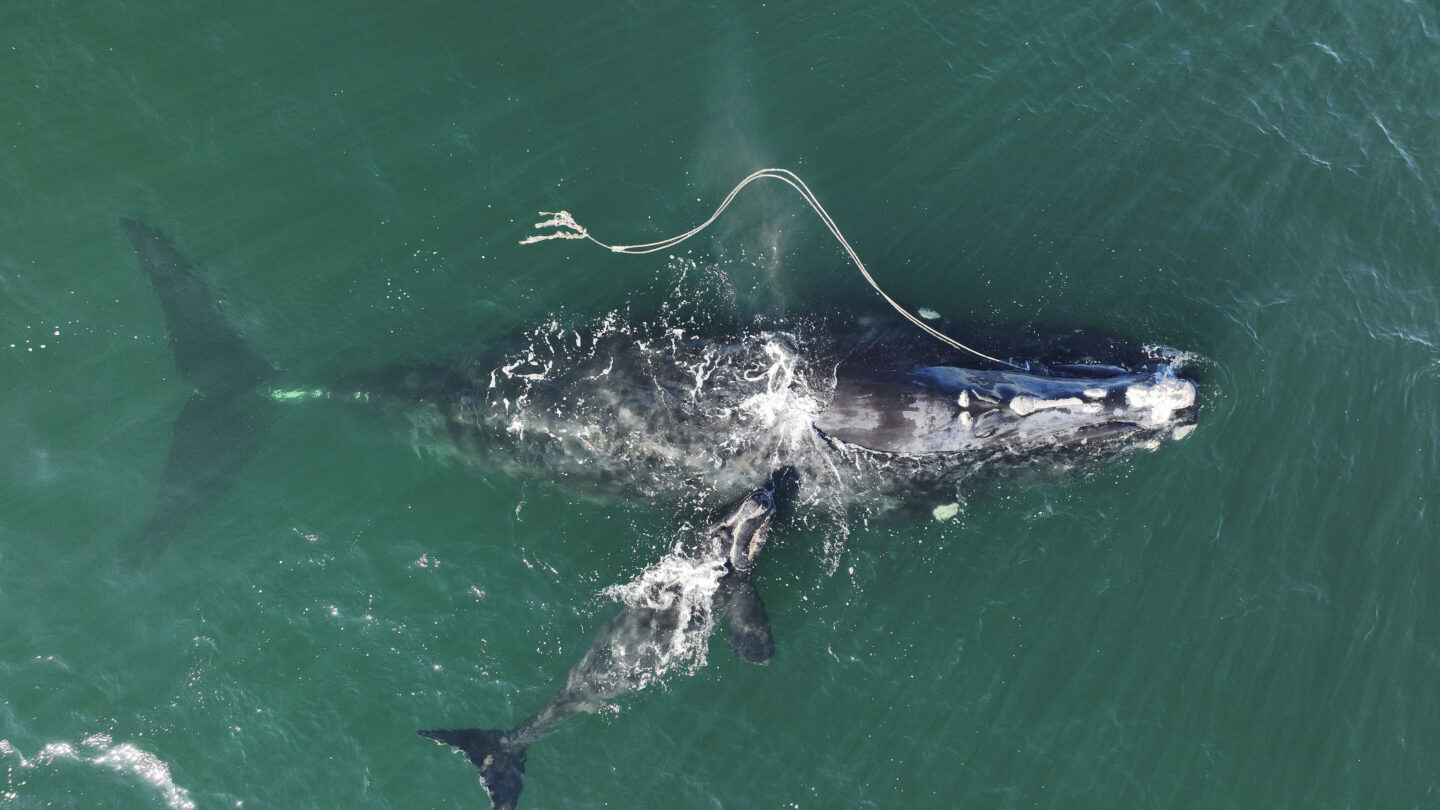Once hunted to near-extinction, the greatest threats to the endangered North Atlantic right whale now are accidental encounters with humans.
Federal efforts to protect the whale species, which spends most of the year off the coast of New England, from collisions with ships and entanglements in fishing gear — incidents that represent the two leading causes of death for right whales, according to the National Oceanic and Atmospheric Administration — remain stymied.
That’s because some policies meant to preserve the right whale are also seen as an existential threat to another treasured icon of New England: commercial fishing.
Testifying at a hearing for a U.S. Senate Appropriations subcommittee last year, the head of the department that includes NOAA, U.S. Commerce Secretary Gina Raimondo, said she understood the competing interests at play.
“We have many thousands of people in Rhode Island who make a living as commercial fishermen, and I know it’s more than just a living,” the former Ocean State governor told Maine Republican Sen. Susan Collins. “It’s a culture, it’s a way of life and it’s a living. I understand that and want to work with you to find a solution. I wish I had an easy solution here.”
Whale advocates have pursued several policy goals to protect the species. But the regulations have been slow to move through the federal bureaucracy, or been met with reversals in Congress spawned by complicated Northeastern politics.
Threat of extinction
Right whales got their name from 19th-century commercial whalers, who viewed them as the “right” whales to hunt because of their high blubber content that also made them easy to harvest as they floated on the ocean’s surface after being killed.
The North Atlantic right whale is one of two right whale species in the Northern Hemisphere. The whales spend most of the year in the waters of New England and Canada and migrate in the fall to calving grounds near Florida, Georgia and South Carolina.
Right whales have been listed under the Endangered Species Act since 1970 and are also protected under the Marine Mammals Protection Act. Attempts at revival seemed promising, as population figures increased throughout the 1990s and 2000s.
But NOAA’s latest preliminary estimate projects there are fewer than 350 now living, down from 481 in 2011.
Vessel strikes and fishing entanglements are the leading causes of death for the animal, according to NOAA. The agency estimates that 21 of the 36 documented right whales killed since 2017 resulted from either being hit by a vessel or ensnared in fishing gear. Another 13 died of unknown causes. The other two died in infancy.
Those numbers likely undercount the number of killed whales, according to NOAA, which projects that only 1 in 3 killed whales are documented.
Environmental advocates say rules to slow vessels and to reduce some ropes used for lobster and Jonah crab fishing would go a long way to helping the whales recover.
Fishing gear entanglements
The federal agency finalized a rule in August 2021 to require new fishing gear in certain areas where right whales travel, including parts of Rhode Island Sound. The required gear would reduce the number of vertical lines and contain weak links to allow entangled whales to escape.
A federal judge ruled in July 2022 that the regulation did not go far enough in protecting right whales and therefore violated the Endangered Species Act. He ordered the agency to come up with a stricter regulation by 2024.
But in December, Collins led the rest of the Maine congressional delegation — Sen. Angus King, an independent who caucuses with Democrats, and Democratic Reps. Chellie Pingree and Jared Golden — in securing a provision in the government spending bill that extended that deadline, and any postponed enactment of the rule from 2024 to 2028.
“Without our provision, Maine’s iconic industry could be facing a complete shutdown — and the ripple effects across our state would have been widespread,” the delegation and Democratic Gov. Janet Mills said in a written statement in December.
The bill also included $40 million to develop ropeless fishing technology.
But the move incensed environmental advocates, who said it increased the chances of extinction.
“With that effectively suspended to 2028, I feel that the danger to outright extinction of the right whale is increasing significantly,” Arizona Democrat Raúl Grijalva, the ranking member of the U.S. House Natural Resources Committee, said in an interview with States Newsroom.
Grijalva, the former chairman of the Congressional Progressive Caucus, introduced a bill last month to repeal the Maine delegation’s provision in the spending law.
Congress shouldn’t interfere with NOAA’s process, he said.
“When Congress circumvents these species recovery decisions, (they) are no longer based on science,” he said. “They’re based on politics. And that was a concern, and continues to be a concern.”
Congressional action unlikely
Grijalva conceded that his bill was unlikely to pass a Republican-controlled U.S. House.
And even among his fellow Democrats, he said he has disagreements with members from the deep-blue New England states about how heavily to regulate fishing and lobster industries.
“It’s an industry that is vital,” Grijalva said. “I don’t deny that.”
Of Rhode Island’s congressional delegation, only first-term House Democrat Seth Magaziner responded to questions from States Newsroom this month about his position on the issue.
Magaziner, who took office in January, said he was still developing his stance.
“As a member of the House Natural Resources Committee, I am committed to common sense policies to protect endangered species, including the North Atlantic right whale,” Magaziner said in a written statement. “I am actively researching the issue, and I look forward to working with my colleagues in Congress to protect North Atlantic right whales.”
The other members of Rhode Island’s delegation, noted environmental champion Sen. Sheldon Whitehouse, Sen. Jack Reed and Rep. David Cicilline, all Democrats, did not respond to messages seeking comment.
Collins and the Maine delegation have pointed out that there is no evidence tying any known right whale death to their state’s lobster cultivators.
Collins also encouraged NOAA to focus on the other major culprit of whale deaths: ship strikes.
‘Playing the lottery’ with delays on speed rule
A NOAA slide show presentation dated Aug. 16, 2022, detailed a proposed rule to expand coastal areas where certain vessels would be subject to speed limits during right whales’ migration season, allowing them safer travel up and down the Atlantic Coast.
The slideshow included a sentence that the agency hoped to have a rule in place in time to protect whales during the calving season that began in November 2022 and ends in April 2023.
But that goal slipped, and as of mid-March the rule was still not final.
Environmental groups Center for Biological Diversity, Conservation Law Foundation, Defenders of Wildlife and Whale and Dolphin Conservation appealed for an immediate, emergency action late last year.
But in January, the agency denied the groups’ petition.
Kristen Monsell, the oceans legal director at the Center for Biological Diversity, said in a statement she was “outraged,” and called the situation “an extinction-level emergency.”
The groups reported that NOAA told them the agency didn’t have the time or resources to set emergency regulations.
Regina Asmutis-Silvia, the executive director of the advocacy group Whale and Dolphin Conservation, North America, said the agency was gambling by not acting this calving season. So far, only one whale — near Virginia Beach, Virginia — has died by a vessel strike this season, but that was a relatively fortunate outcome.
“They won the lottery by … saying they could get away with not doing something this calving season,” she said. “We didn’t want to play the lottery with right whales.”
Lauren Gaches, a spokeswoman for the National Marine Fisheries Service, also called NOAA Fisheries, said in an email that the agency plans to finalize a rule expanding speed zones this year.
“NOAA Fisheries and our partners are dedicated to conserving and preventing the extinction of North Atlantic right whales,” she said.
NOAA Fisheries, the federal agency responsible for overseeing marine resources, is led by Assistant Administrator Janet Coit, who formerly led Rhode Island’s Department of Environmental Management.
With their petition denied, advocates are now unsure when they will see a final rule, and what it will look like if it is released.
Asmutis-Silvia said she will be eager to see if the final rule is as comprehensive as the proposal.
“Just because you proposed something doesn’t mean that’s what you get,” she said. “So we’re in a little bit of a holding pattern right now to decide what that next step is based on when it comes out and what it includes.”









